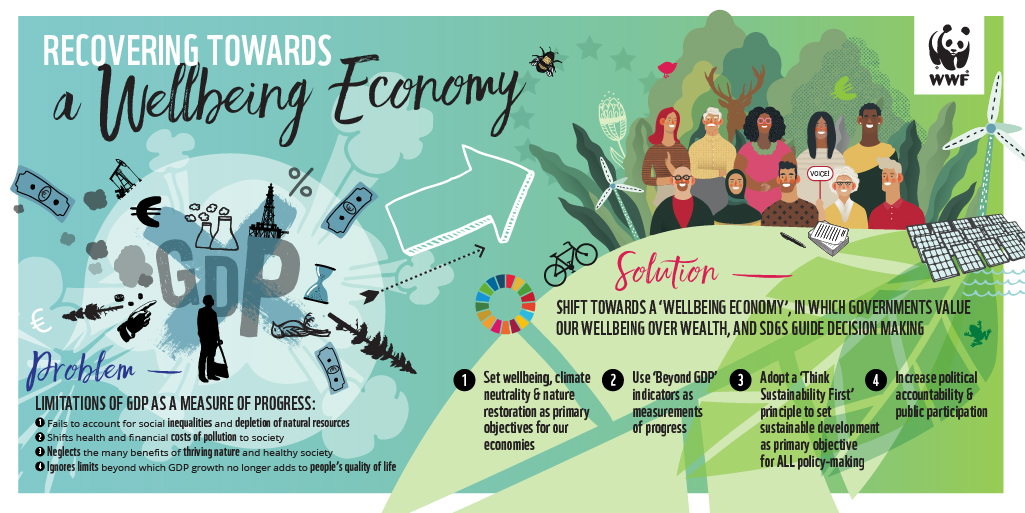The WWF is run at a local level by the following offices...
- WWF Global
- Adria
- Argentina
- Armenia
- AsiaPacific
- Australia
- Austria
- Azerbaijan
- Belgium
- Bhutan
- Bolivia
- Borneo
- Brazil
- Bulgaria
- Cambodia
- Cameroon
- Canada
- Caucasus
- Central African Republic
- Central America
- Chile
- China
- Colombia
- Croatia
- Democratic Republic of the Congo
- Denmark
- Ecuador
- European Policy Office
- Finland
© Lambert / Shutterstock
Towards an EU Wellbeing Economy
What is a ‘Wellbeing Economy’?
A ‘wellbeing economy’ starts from the idea that public interests should determine economics and not the other way around. Rather than pursuing economic growth through narrowly defined indicators such as GDP, a wellbeing economy monitors and values what truly matters: our health, nature, education, and communities.
Why the EU needs to shift to a Wellbeing Economy
The COVID-19 pandemic has placed a magnifying glass on the inescapable interconnection between human health and the health of our planet. There is increasing evidence of the links between environmental degradation, biodiversity loss, the illegal wildlife trade and the emergence of new diseases.
Therefore WWF believes it is crucial that the recovery is carried out in a way that not only helps tackle climate and environmental breakdown but also social inequalities. For this, new means of decision-making will be needed, taking into full consideration impacts on people and the environment.
What is already happening?
- Before the pandemic hit, EU Member States had already called in 2019 for an EU-wide long-term strategy reflective of wellbeing.
- In January 2020, the European Economic and Social Committee called for a different way of evaluating the wellbeing of European citizens and the health of European economies.
- EU capitals such as Amsterdam and Brussels have decided to apply Doughnut Economics to transition towards an economic model of cities and people thriving in balance with the planet.
- In September 2020, the European Commission recognised that the health crisis had ‘reignited the debate on what kind of economic growth is desirable, what actually matters for human wellbeing in a world of finite resources and on the need for new metrics to measure progress beyond GDP growth’.
- In May 2021, EU heads of state and government adopted the Porto Declaration, in which they welcome a proposal for an alternative set of indicators to measure economic, social and environmental progress, supplementing GDP.
What WWF is doing?
In September 2020, WWF EPO launched the report ‘Towards an EU Wellbeing Economy - a fairer, more sustainable Europe post Covid-19’.
The report puts forward concrete recommendations on ways the EU institutions can implement a Wellbeing Economy approach. These include:
- A new EU framework for measuring progress and wellbeing in the EU, with alternative indicators based on the SDGs that complement and correct GDP;
- Setting out an overarching high-level EU commitment and vision for an EU Wellbeing Economy with wellbeing, climate neutrality and nature restoration as primary objectives;
- The introduction of a ‘think sustainability first’ approach for all new legislation and policies;
- Greater political accountability in all main EU institutions, with regular monitoring and engagement with Civil Society, and notably the (re)establishment of a high-level advisory body to the European Commission on SDG delivery;

Contacts